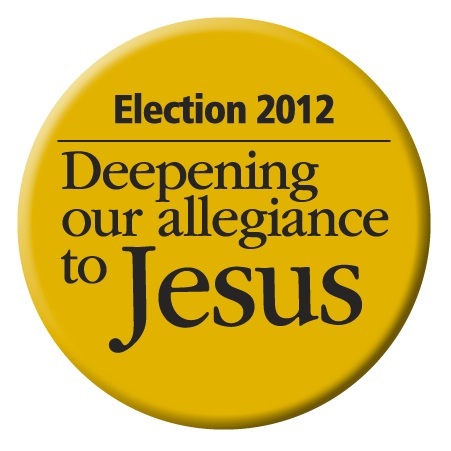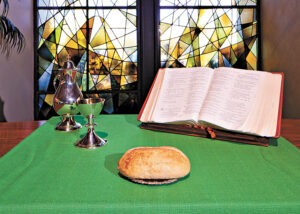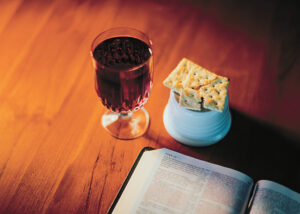Mennonite pastors Mark Schloneger and Kevin Gasser hope they can get 100 churches in all 50 states to join them in a celebration of communion on the evening of Nov. 6—Election Day 2012—“to remember what really matters.”
“We’ll remember that real power in this world—the power to save, to transform, to change—ultimately rests not in political parties or presidents or protests but in the life, the death, and the resurrection of Jesus,” writes Schloneger, pastor of North Goshen (Ind.) Mennonite Church, on the website of the Election Day Communion Campaign.
He started the website with Gasser, pastor of Staunton (Va.) Mennonite Church, and Ben Irwin, member of an Episcopal Church in Grand Rapids, Mich.
The campaign is gaining support not only among Mennonites but also ecumenically.
“It is so easy for us to surround ourselves with people who think, look, believe and act just like we do. But that’s not what Jesus’ dinner party looked like, and that isn’t what we are called to do as Jesus’ followers,” Gasser writes.
The Election Day Communion website lists nine confessions for communion participants, concluding with, “We’ll remember the body of Christ as the body of Christ, confessing the ways in which partisan politics has separated us from one another and from God.”
Congregations and individuals can communicate their intentions to participate on the website.
At the denominational level, the Executive Committee of Mennonite Church USA’s Executive Board is inviting the church to engage in prayer and fasting prior to the election as a way of “deepening our allegiance to Jesus.”
Citing this election cycle as a season of temptation, they urge Mennonites to follow the example of Jesus, who faced and rejected promises of influence and dominating power.
“There is a danger that our political leanings, in any direction, may shape our understandings of faith and life more deeply than the Bible and the life and teachings of Jesus,” says Dick Thomas, moderator. “This call envisions that by reflection, prayer, fasting and conversation, we will be shaped by Scripture and made alive by the Spirit in community during this time of a national election.”
Jason Boone, coordinating minister of the Peace and Justice Support Network, which is jointly administered by Mennonite Church USA and Mennonite Mission Network, adds that the EB’s invitation is “a wonderful chance to draw closer to Jesus and to think about prayer and fasting in creative ways.”
“Fasting can be more than skipping a meal; it’s an opportunity to lay aside anything that may take our focus from Jesus,” he says. “During the election season, fasting could include avoiding political commercials or political back-and-forth on Facebook. Likewise, prayer is a conscious turning towards God and can take many forms. Prayer in the election season may be intentionally spending more time in Scripture.”
The Peace and Justice Support Network is responding to the EB’s invitation with resources to help the church deepen its commitment to Jesus during this election season, such as a virtual conversation among three different voices about discerning political engagement and Christian allegiance that will take place online.
“The spiritual ‘I woke up this mornin’ with my mind stayed on Jesus’ is a great expression of this groundswell of engagement,” says Nancy Heisey of the Executive Board. “I’m glad to be part of a faith community who walks through political turmoil seeking to keep our ultimate commitments clear.”
Another grassroots initiative that is generating conversation is a Voter Pledge 2012 drafted by Mennonites in Lancaster, Pa., including Berry Friesen, John Stoner, Harold A. Penner, and Daniel and Marie Riehl.
According to their website, they are inviting people to pledge to vote for neither the Republican nor Democratic presidential nominees in this election as an expression of conscience, noting that—in key policies—they see the two parties as being “consistent with each other and yet so far from the values we hold dear.”
The organizers say they intend to vote in state and local elections to express their preferences for approaches that affect domestic U.S. policies.
–Sept. 17, 2012







Leave a Reply
You must be logged in to post a comment.